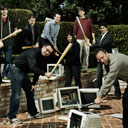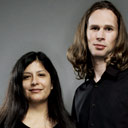 |  | |
The main feature
|
 |  | A bigger bang
John Lanchester gets to grips with the virtual universe and Guardian writers interview the smartest and the luckiest entrepreneurs who demolished the old internet and built a brand new one.
Video: the web revolutionaries |
| |
Video
|
The web revolutionaries
What exactly is web 2.0? Does it even exist? Founders of some of the world's most successful websites talk to Ian Katz and Oliver Burkeman about how users reclaimed the web. |
| |
The interviews
|
 |  | Wikipedia, Jimmy Wales
People expect him to betray some sense of astonishment at the way that his website has reshaped the terrain of human knowledge. But actually, that's pretty much what Jimmy Wales had in mind all along.
Audio: Extracts from the interview with Jimmy Wales (7MB, 15:13) |
| |
Blogger/Odeo, Evan Williams
In 1999, Evan Williams and friends Meg Hourihan and Paul Bausch began writing blogs. They found the process rather cumbersome, so they wrote some code to make it easier and called it Blogger. |
| |
WordPress, Matt Mullenweg
Matt Mullenweg began tinkering with open source software to develop WordPress, a set of free, self-publishing software with clean typography and clever functions that soon attracted a blogging elite. |
| |
 |  | Bebo, Michael and Xochi Birch
Bebo, like MySpace, provides its more than 23m users with a kind of prosthetic personality extension: a profile page where they can post diary entries, photographs, music, and homemade video.
Audio: Extracts from the interview with the founders of Bebo (6.5MB, 13:53) |
| |
Writely, Sam Schillace
Taking an existing idea and improving upon it is a much more daunting task - especially when the leader in your area happens to be that lumbering behemoth of computer programs, Microsoft Word. |
| |
Digg, Kevin Rose
Kevin Rose, a strikingly laid-back 29-year-old, runs Digg, one of a handful of websites gambling on the hunch that editing the news might be a job best done by the readers. |
| |
 |  | Craigslist, Craig Newmark and Jim Buckmaster
For a man whose contribution to society consists of series of no-frills classified advertising websites, Craig Newmark seems to attract extraordinary veneration.
Audio: Extracts from the interview with Craig Newmark (5.8MB, 12:27) |
| |
Last.fm, Martin Stiksel
Started in 2002 by Stiksel and Felix Miller as an online radio station and music community website, the team heard about a project called Audioscrobbler, developed by computer science student Richard Jones, and joined forces to create today's all-round music service. |
| |
 |  | Del.icio.us, Joshua Schachter
Like several Web 2.0 success stories, Del.icio.us began life as the elegant solution to a problem encountered by its creator.
Audio: Extracts from the interview with Joshua Schacter (3.5MB, 7:17) |
| |
Feed Burner, Dick Costolo
Do you know what an RSS feed is? Well, Dick Costolo thinks you're going to be using them every day soon. |
| |
 |  | Netvibes, Tariq Krim
Krim started a French blog devoted to the emerging 'MP3 generation'. Seven years on, he says, his main music blog attracts more readers than his old newspaper, La Tribune.
Audio: Extracts from the interview with Tariq Krim (7:22) |
| |
Technorati, David L Sifry
Garrulous and geeky, bubbling with energy and ambition: if ever there was a born software entrepreneur, David Sifry is it. |
| |
 |  | Flickr, Caterina Fake and Stewart Butterfield
For a whole generation, Flickr has become simply what you do with your pictures. The result is that Flickr has evolved into a giant, constantly updated snapshot of the planet.
Audio: Extracts from the interview with the founders of Flickr (11:21) |
